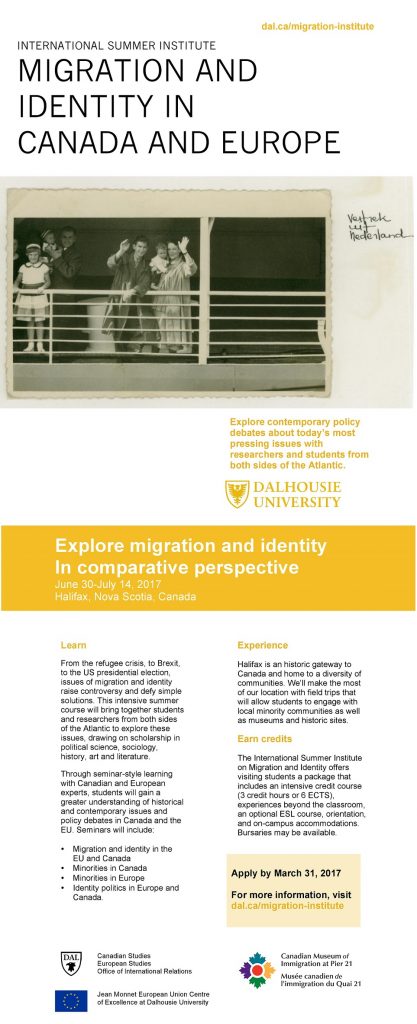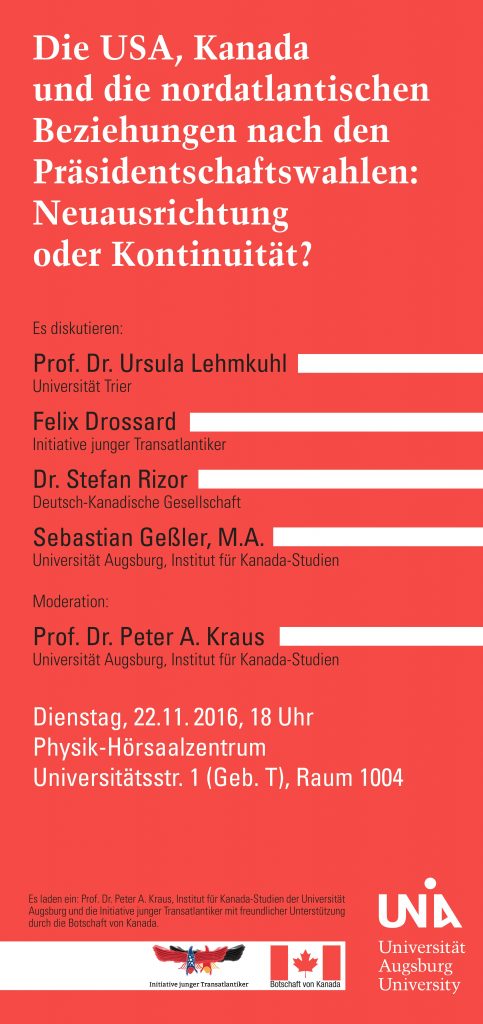Kategorie: Veranstaltungen
8th International Conference Organized by SACS (Association for Canadian Studies in Serbia) and the Faculty of Philology of the University of Belgrade, 22 – 23 April 2017, Belgrade
James Cameron, a widely acclaimed contemporary Canadian film director, defines the cruy of the filmmaking business in a nutshell: „I’m a storyteller; that’s what exploration really is all about. Going to places where others haven’t been and returning to tell a story they haven’t heard before“ (USA Today, May 24, 2013).
As if to confirm this view, on April 29, 2014, the first public celebration of National Canadian Film Day was organized, including widely popular screenings of Canadian films, panel discussions hosted by recognized Canadian filmmakers and numerous debates about Canadian films across the country. Due to a significant print and media coverage and even the recognition in the House of Commons, this inaugural event instantly became a huge success. From this day onwards, National Canadian Film Day has become an annual event held all across Canada with the main purpose of celebrating Canada through Canadian film. The organizers of this national event state that way back in the past it was the railroad that tied Canadians all together, whereas in th 21st century another kind of cohesive track is needed – film!
Inspired by the recent public recognition of film in Canada, the Association for Canadian Studies in Serbia (SACS) and the Faculty of Philology of the University of Belgrade are pleased to announce the 8th International Conference hosted by the Faculty of Philology to be held in Belgrade, Serbia, 22 – 23 April 2017. It is relevatnt ot note that the title of the conference primarily refers but is not limited to films created in Canada and directed by Canadian directors. Any examples of films testifying to Canadian experience and made outside Canada by non-Canadian filmmakers are extremely welcome!
The organizers are pleased to announce that the confirmed plenary speaker is Janice Kulyk Keefer, a renowned Canadian novelist, poet and critic. She was short-listed for a Governor General’s Literary Award in 1987 and 1996. In 1999, she received the Marian Engel Award for a female Canadian writer in mid-career; in 2008, she was awarded the Kobzar Literary Award. Keefer taught literature and theatre in the graduate studies department at the University of Guelph, where she is now Professor Emerita.
Papers to be presented in either English or French are warmly invited from all disciplines as well as from multidisciplinary perspectives. In the general context of film, the Conference would like to achieve a clearer picture of contemporary Canada and its modern sensibility represented through this artistic medium.
The following suggestions for topics move from the very broad to the more particular and circumscribed, but of course in no way do they exhaust the multitude of possibilities:
- social issues (abortion, divorce, gambling, gay marriage, prostitution, marijuana and hard drugs)
- problems facing the Aboriginal People of Canada (Child Welfare Programs, Cases of Missing Aboriginal Women, destiny of native langs, history of residential schools, mythology)
- multiculturalism and ideology of democracy and equality in education, arts, sports
- Economy, globalisation and geopolitics: challenges and perspectives
- Class, race, gender, age, minority differences in the context of thnic and cultural diversity
- Canada: current political challenges (Temporary Foreign Workers, healty environment, identity politics)
- Canadian literature on film: adaptations, influences, developments, trends
- Canada in visual arts: theatre, photography, video, architecture, drawing, painting, performing arts, conceptual art
Contributions may come from the fields of films tudies, sociology, history, literature, psychology, economics, linguistics, geography, arts, architecture, social sciences, philosophy, journalism, etc.
Please send your proposal to Vesna Lopičić.
Deadline for submissions: January 1, 2017.
Plesase submit your theme, a 200-word abstract, your affiliation and a five-line CV. Please find the registration form here.
Colloquium, 18 – 19 May 2017, Université de Nantes, France
Organizers: Daniella Kostroun (Indiane University – Purdue University, Indianapolis / IEA Nantes) and Yann Ligneureux (University of Nantes)
Sponsored by the Research Center for International and Atlantic History (CRHIA); Labex „Writing a New History of Europe“; the program „STAtutes, ‚RAces,‘ and ‚COlors,‘ in the Atlantic from Antiquity to the Present;“ and the Institute for Advanced Studies, Nantes.
The political, social, and religious systems of Old Regime France were designed and built on traditional, classical ideas about hierarchy and order in ways that promoted an ideal of a stable, self-reproducing system, one that was immune to the changes and contingencies that came with the passage of time. But what happened to these systems when they were contested and disrupted by the increase in commercial activity and the movement of people across the Atlantic Ocean in the 16th – 18th centuries? What were the effects, on individuals and on the society in which they lived, of this new „disorientation“ of institutions, families, and self-representations? What degrees of disorientation did this experience of alterity present, perhaps less in the matter of discovering of other places than in the process of self-discovery that occured in the hearts and souls of individuals?
The organizers explore these questions because the disorientation that resulted from colonial enterprises was a process that unfolded at the very heart of a worldview, one that had its traditional certainties and tenets challenged, weakened, and overturned. Assumptions about our human nature, our relationship to the divine, the essence of our political behaviour, and our need to build societies fell subject to what Jean Rohou has called the „revolution of the human condition“ in the 17th century. The disorientation experienced by the men and women who engaged in the Atlantic adventure was not just a test of distance, but a process of distanciation. Whether this process occured slowly and imperceptively or with incredible speed, it carved into individual consicences and the collective imagination new divides that were possibly as daunting as the ocean that had to be crossed. Was the long voyage from the old France to Canada or the Antilles, made out of fear or out of hope, an opportunity for liberation? Was the New World a place for renewal? Moreover, were these strangers in new worlds susceptible to an estrangement from themselves as they confronted new intersections of intimate, personal, communal and collective spheres?
These questions of the self, of the intimate, and of that which is called ipseity, have a history and an archaeology in the sources of their own. They are embedded in the accounts of the discovery and exploration of new lands in the Americas and of the peoples living there. Writers at the time were preoccupied by them. We find, either explicitly or in ways that were more indirect, in the administrative documents, personal letters, religious treatises, and literary texts, and other genres – including all other forms of artistic expression – discourses relating to peoples‘ fears and hopes surrounding the effects of the specific distanciation at work as they crossed and inscribed themselves in these new worlds.
The goal of this colloquium is to shed light on these fragile discourses and to take stock of them. They are fragile because they are at the cusp of what has since become a ridge demarking differences that needed to be protected, constructed, and overstated in subsequent centuries. In specifying how French men and women perceived this distanciation amongst themselves, this colloquium will help us understand differently how they interacted – whatever the nature of their projects in the Atlantic – with each other and with the other people whom they came to see as fundamentally other. It will also help us to think more generally about the problems France faced when it sought to uphold an ideology of stability and order in a world that was in reality shifting and demanding constant negotiation.
Plese submit paper proposals in French or English (approx. 350 words) and a short CV to the two organizers Daniella Kostroun and Yann Lignereux by December 20, 2016.
Sixth Annual Meeting of the Northeast and Atlantic Region Environmental History Forum (NEAREH, formerly known as NACEHF), May 19 – 20, 2017, University of Connecticut, Avery Point Campus, Groton, CT/USA
Following a half a decade of research in the environmental histories of Northeast US and Atlantic Canada, the 2017 NEAREH Forum solicits papers exploring the ties linking people and places throughout eastern North America and the northwest Atlantic. People have long moved, lived, worked, and travelled throughout this region, drawing its communities and resources into larger networks—both before and after colonization. Focusing upon the environmental histories of such connections, this workshop seeks to bring to light how such linkages defined, evolved, adapted, and fell apart as people scribed lines across the region’s lands and seas. In addition, the Forum invites explorations into definitions and redefinitions: how have we, and how should we define this (or these) regions? What new interpretations emerge when we compare conventional understandings with those emanating from environmental perspectives? How can the region’s past—and constructions of the past—inform collective responses to future challenges?
NEAREH 2017 invites proposals from scholars exploring these—and related— questions from a wide range of disciplines that fall under the wide lens of environmental history—including (but not exclusively) Native American/First Nations studies; gender, race, class, and sexuality studies; history of science; historical terrestrial/marine ecology; and labor perspectives.
The workshop will meet at the University of Connecticut’s Avery Point Campus in Groton, Connecticut. Across town, the village of Mystic offers a range of accommodation options. Low cost housing for those interested is also possible. Mystic is also regionally known for farm/fishery-to-table dining (more details to come), as well as hosting Mystic Seaport Museum and the Mashantucket-Pequot Museum. Excursions to both will be organized if attendees express interest.
Five hundred word paper proposals should be submitted to Matthew McKenzie by 1 February 2017. Full papers, 25 pages maximum (strictly enforced), will be due by 15 April for pre-circulation.


